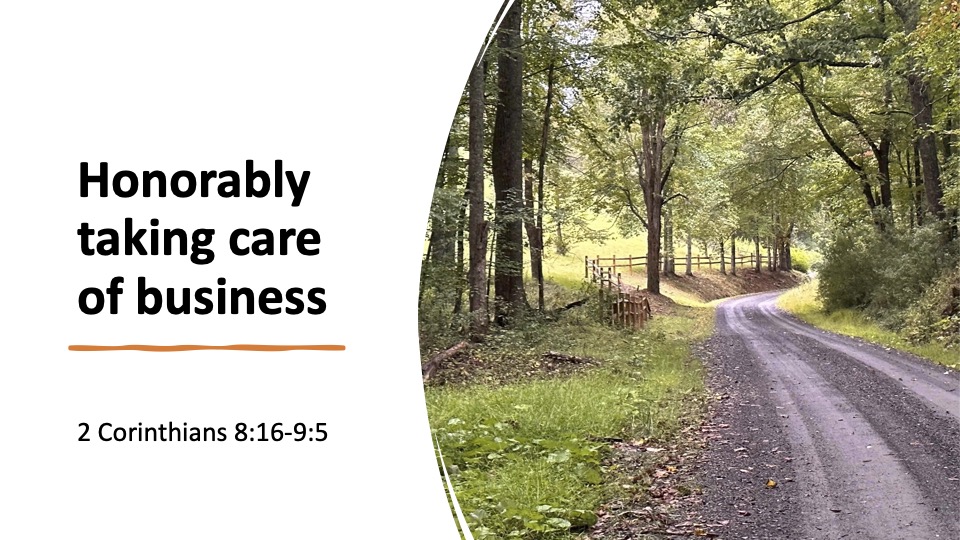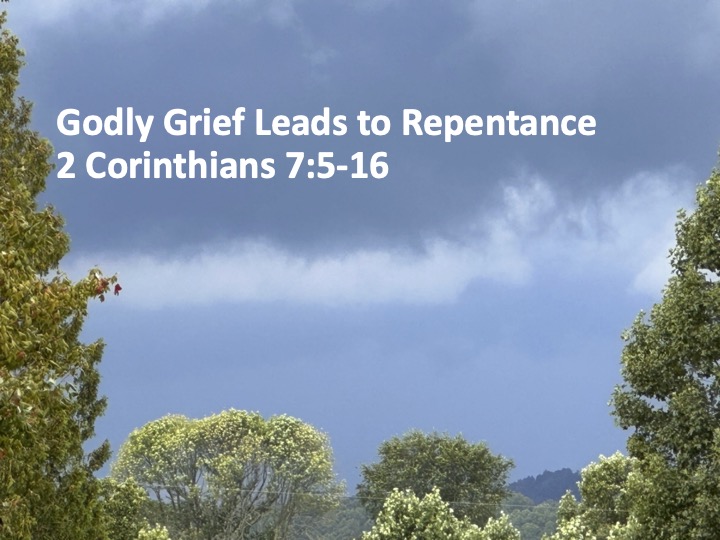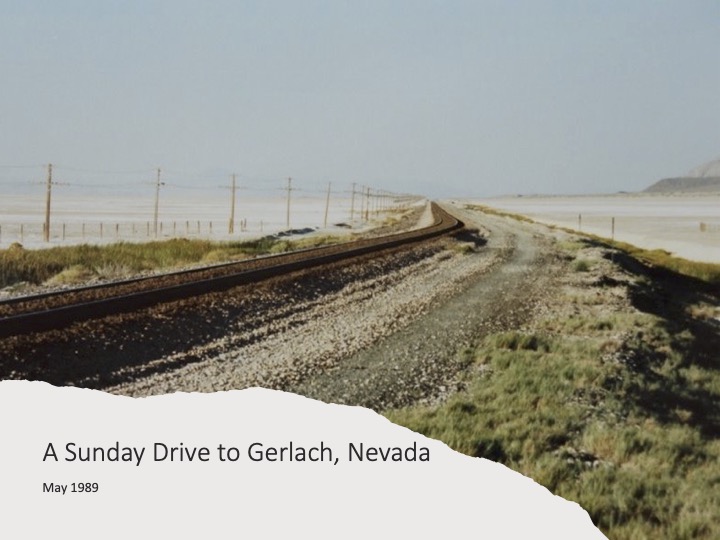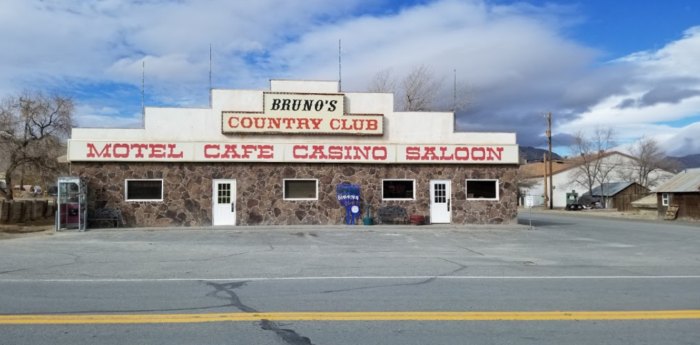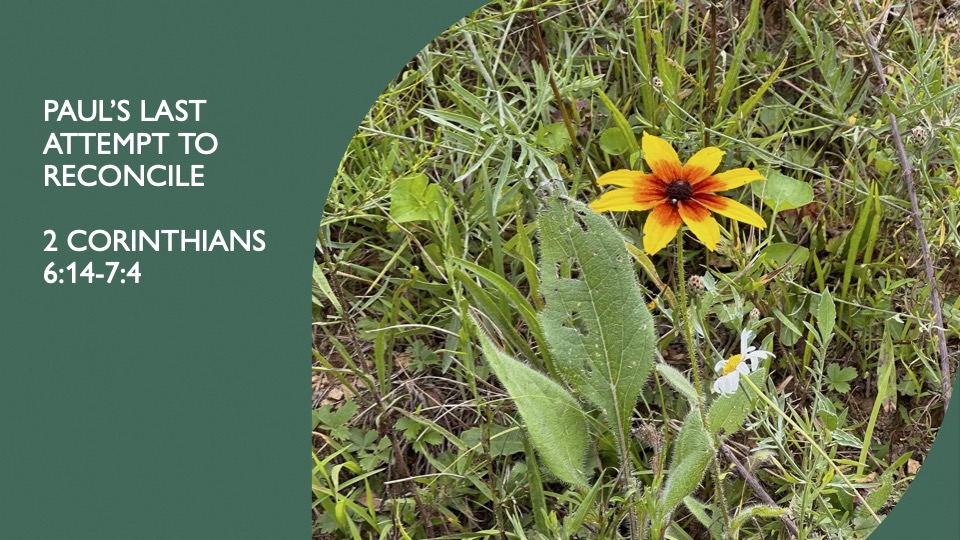Jeff Garrison
Mayberry & Bluemont Churches
October 1, 2023
2 Corinthians 9:6-15
At the beginning of Worship
There’s an old legend. I think comes from a Native American tradition which speaks of a fist. We make a fist for fighting, but if you look at it, it’s plain to see that a fist is unable to receive gifts. To receive, we must open our hands and be thankful.
But not only do we need to be thankful for what we’ve been given, we should also be generous so that others are blessed. A generous heart is one that graciously receives the gifts we’re given in this life while sharing with others. We’ll talk more about this later this morning.
Before reading the scriptures
Stoicism was a philosophy in the ancient world. Its purpose was to produce individuals who were content with what they had and where they were in life, while also helping them to be self-sufficient. There are people like that today. On the one hand, it is good for us to be self-sufficient. But there is a danger in this philosophy, which Paul challenges. We’ll see this in our reading today from 2nd Corinthians. Paul wants the Christian to acknowledge his or her dependance upon God.[1]
As you know, we’ve been working our way through this letter of Paul’s. The Apostle spends the 8th and 9th chapters focusing on a gift for those suffering in Jerusalem. This was perhaps the first foreign mission collection made in the history of the church.
Setting for today’s reading
The Corinthian Church has promised a gift, but it hasn’t been forthcoming. Paul doesn’t want to humiliate the Corinthians into giving. However, as we saw last week, he does suggest that if their gift doesn’t materialize, he and the Corinthians are going to have a hard time living it down. After all, their poorer neighbors to the north, the Macedonians, have already made a generous gift.[2] But giving to maintain honor is not a good reason. Paul doesn’t want them to feel compelled to give. He wants them to give cheerfully because they are sharing in God’s work.
It had been a long hard winter. The snow piled deeper and deeper as the mercury plunged and rivers froze. People suffered in the mountains and the Red Cross responded. They lined up helicopters and as soon as the weather cleared, they flew in supplies.
One crew after working all day spotted a little cabin buried in the snow, with a wisp of smoke coming from a chimney. The team assumed they could use some help, but there was no way they could get the ‘copter down near the cabin. They sat down about a mile away and one of the rescuers volunteered to ski in with some essentials. It was exhausting work, pushing through snow drifts as he broke trail.
Finally, he reached the cabin and knocked on the door, exhausting and panting. A startled mountain woman opened the door and the man gasped, “I’m from the Red Cross.” “I’m sorry, Sonny,” she said closing the door. “It’s been a long and hard winter, and we don’t have anything left to give.”[3]
gIving and receiving
Friends, as God’s chosen, we need to practice how to give and receive. Paul gives us some clues about how to do this in our passage today. We’ve been blessed so that we might be a blessing.
Paul makes it clear in this passage that God supplies the gift and blesses the giver. God provides the gift because God wants us to be able to participate with him, doing his work in the world. Verse eight reads in The Message translation, “God can pour on the blessings in astonishing ways so that you’re ready for anything and everything, more than just ready for what needs to be done.”[4]
Giving without being aware of the real need
Notice it doesn’t say anything about an amount of a particular type of gift. Nor does it even say anything about the need of the recipient.
Paul doesn’t shame the Corinthians into giving by pointing out how those in Jerusalem are starving and malnourished. He doesn’t show any photos of kids with skinny arms and legs and extended stomachs, suggesting that for just a dollar a day, this child can have a better life. Now, there are a lot of groups who do good work using such techniques, but that wasn’t Paul’s way. Shaming is a technique that may works well, but it’s not Biblically grounded.
Instead, Paul points out the need for them (and for us) to give. By giving, we fulfill God’s intention for our lives and allow God to bless us even more. By giving thankfully, we grow into a Christ-like life.
Like the Corinthians, we need to give. Some of us can make large gifts while others of us are only able to make a modest gift, or what may seem to be only a small gift. But all are valuable. As it has been pointed out in many sermons, the largest and the smallest gift in scripture is the same one. The widow who gave her two small coins gave all she had. By percentage, it’s the largest cash gift recorded in scripture. But because the two coins were so insignificant, it’s also the smallest. [5]
We give, not because we can make a difference. We give because God gave to us first and because we want to be a part of the work God is doing in the world.
Giving involves more than money
By the way, although Paul talks about a financial commitment with the Corinthians, our giving is more than just putting money or checks into the offering plate, or the gifting of stock or real estate. God has given us so much more. The financial part is critical to our spiritual development. You’ve probably heard before that Jesus talked more about money and the proper use of treasures than of any other topic except prayer.
Beyond money, it is also important for us to give of our time and talents, to show of empathy, and the willingness to be with others during times of trial. As God’s elect, we are to be doing God’s work in the world. Through the church, God partners with us so that we might show the world a better way of living.
Partnering with God
Isn’t it exciting God wants us partner with him? But more than that, God also provides us the means to contribute. It has often been said that the church will never have enough, but it always has enough for its mission. God sees to it that we have what we need to carry forth our work in the world. From a business standpoint, this might not make sense. Our analytical minds want us to have all the resources lined up in advance, but God doesn’t work that way. He wants us to go forth while trusting and being dependent on him. When everything is assured, there is no room for faith.
Spiritual impact to the receiver (The JERUSALEM Community)
Paul doesn’t end this discussion with the benefits that giving has for the giver, but he goes on to discuss the spiritual impact upon the recipient of the gift. He suggests those in Jerusalem, who receive the gift, will give thanks to God for the Corinthians and their faithfulness.
The believers in Jerusalem are Jewish Christians and they’ve not been overly thankful for Gentile Christians. But Paul suggests that because of their gift, those in Jerusalem will have a change in heart. Instead of looking down their noses at the Gentiles, they’ll give thanks to God and will pray for them. The Jewish Christians are being prompted for a second conversion, one that will welcome all those who Christ calls to himself.[6]
God’s generosity should melt our hearts. Generosity has the power to even melt the hearts of our enemies. Our generosity is anchored in God’s generosity. As we give, God graciously provides.[7] When we train our hearts to be generous, God can bless us even more. When we are generous and gracious to all, including our enemies, we are living as God intends.[8]
Annie Dillard as a Child
Annie Dillard in Pilgrim at Tinker Creek, her first book which also won the Pulitzer Prize, tells of a game she played when she was a child of six or seven. She’d take a penny and hide it where someone could find it. It was great joy to her, as a young girl, to be a blessing to the one who found and pocketed her penny. She would hide the penny along the sidewalk near her home, cradling it within the roots of a sycamore or in a chipped off piece of concrete.
But it wasn’t enough to just hide the penny, as she wanted to experience the excitement of it being found. She would take chalk and draw arrows toward the penny. She’d write, “SURPRISE AHEAD or MONEY THIS WAY. The thought of a lucky by-passer, who without merit found the penny as a “free gift from the universe,” excited her.[9]
Excitement of Giving
Think of the excitement of Annie Dillard as a child or, as the young girl I told you about two weeks ago, who fed peanuts on an airplane. We can have just as much excitement as adults, partnering with God and giving to programs that help build God’s kingdom. Generosity is counter cultural. It is an antidote to a self-centered, narcissistic, me-first society. Cultivate a generous heart. And as you give, trust that God will continue to give to you so that you will be able to be even more generous. Amen.
[1] C. K. Barrett, A Commentary on the Second Epistle to the Corinthians (1973, Peabody, MA: Hendrickson Publishing, 1987), 237.
[2] 2 Corinthians 8:1-6. The idea of a gift is introduced in 1 Corinthians 16:1-4.
[3] James Hewett, ed. Illustration’s Unlimited as used by John Salmon in a sermon.
[4] 2 Corinthians 9:8, The Message Translation.
[5] Mark 12:41-44, Luke 21:1-4.
[6] When I am speaking of a “second conversion, I am thinking of it in terms of Peter. Even after accepting that Jesus was the Messiah, Peter had to another conversation in order to be open to the Gentiles. See Acts 10. Often times, our Christian walk isn’t about just one conversion but a series of conversions as we make small steps toward becoming the people God calls us to be.
[7] Jeff Manion, Satisfied: Discovering Contentment in a World of Consumption (Grand Rapids: Zondervan, 2013), 148.
[8] See Exodus 23:1-9.
[9] Annie Dillard, Pilgrim at Tinker Creek (NY: Harper and Row, 1974), 15.





